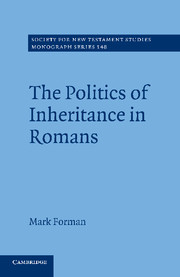Book contents
- Frontmatter
- Contents
- Preface
- List of abbreviations
- 1 Introduction: the politics of inheritance?
- 2 Some features of Greco-Roman society in the symbols, ritual and literature of Paul's time
- 3 Promising the world: inheritance in Romans 4:13–25
- 4 Suffering “conquerors”: inheritance in Romans 8:17–39
- 5 “Riches for the world”: inheritance in Romans 11:1
- 6 “Lords” over all the world: the language of inheritance in Galatians
- 7 Inheritance in 1 Corinthians and Colossians
- 8 Conclusions
- Bibliography
- Index
- References
2 - Some features of Greco-Roman society in the symbols, ritual and literature of Paul's time
Published online by Cambridge University Press: 03 May 2011
- Frontmatter
- Contents
- Preface
- List of abbreviations
- 1 Introduction: the politics of inheritance?
- 2 Some features of Greco-Roman society in the symbols, ritual and literature of Paul's time
- 3 Promising the world: inheritance in Romans 4:13–25
- 4 Suffering “conquerors”: inheritance in Romans 8:17–39
- 5 “Riches for the world”: inheritance in Romans 11:1
- 6 “Lords” over all the world: the language of inheritance in Galatians
- 7 Inheritance in 1 Corinthians and Colossians
- 8 Conclusions
- Bibliography
- Index
- References
Summary
If it is the case that interpretations of inheritance in Paul have made little or no attempt to situate this language within the social and political context of the Greco-Roman first century, then it is not surprising that readings of inheritance typically give little thought to the extent to which it was subversive of its wider socio-political environment. In order to redress this tendency, I will describe some aspects of the social, political and religious environment of the city of Rome and the Roman Empire during the time when Paul wrote Romans. As noted in the Introduction, one of the arguments of the present study is that the language of inheritance evokes ideas about God's future renewal of this world and (in broad terms) what such a world might look like. It will also be suggested that the language of inheritance conveys expectations as to who inherits the land and how land (and by extension, power, control and sovereignty) should be distributed and managed in society. If this is an accurate understanding of inheritance in Romans (a question which remains to be explored in this study) then there are aspects of Greco-Roman imperial society with which the inheritance language will have jarred and clashed. What were the expectations of the Roman leaders and the general population with regard to an ideal society and empire? What did they want for society and how did they think this would come about (or had already been achieved)?
- Type
- Chapter
- Information
- The Politics of Inheritance in Romans , pp. 20 - 57Publisher: Cambridge University PressPrint publication year: 2011

